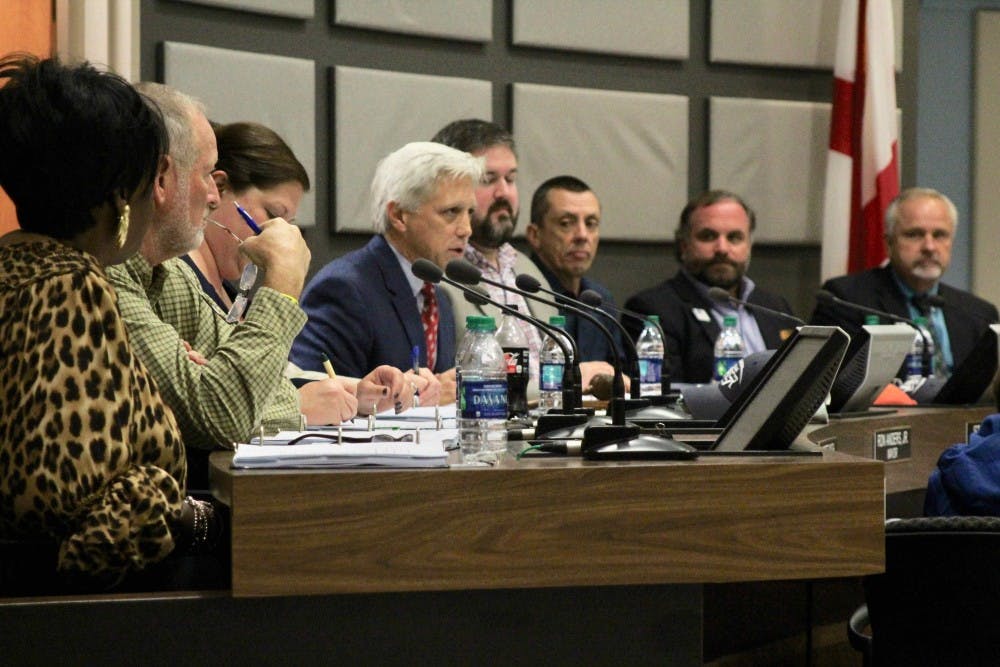After an incendiary, two-and-a-half hour night of debate — which was tangled in accusations of neglect, overreach and racism against white people — the City Council narrowly passed the Academic Detached Dwelling Unit ordinance, along with two amendments.
The ordinance at stake concerned the ever-increasing amount of student houses being built in residential neighborhoods — primarily historically black neighborhoods in Northwest Auburn. The houses, which are built for students and yet qualify as single-family homes because of zoning and occupancy regulations, are raising fears of gentrification across Auburn.
The ordinance will allow the city to regulate those structures differently than homes meant for families by labeling them ADDUs. But as one developer said in his denunciation of the ordinance, “There’s not a solution that’s going to make everybody happy.”
His fortune, it turns out, came true.
During the meeting, a resident of Northwest Auburn, Elizabeth Hill, spoke against the labeling of her neighborhood near Canton Avenue as a place for conditional ADDU approval — meaning more ADDUs could potentially be built there in the future.
“I would like to see, and I think the majority of our neighborhood would like to see, no more of these [student houses] in our neighborhood,” Hill said.
One of the amendments allows ADDUs to be conditionally approved in neighborhood redevelopment districts east of North Donahue Drive.
So in places like Frazier Street, where residents previously told The Plainsman that they are being forced out of their homes because of student housing, more student homes could potentially be built. And in the Canton Avenue area, where Hill and others said they have already been affected, their zoning leaves them susceptible to more student houses springing up around them.
The second amendment the Council added states that ADDUs will be permitted by right in redevelopment districts, meaning nothing can prevent developers from continuing to build student houses in places zoned as redevelopment district, or RDD.
Two citizens who live in Northwest Auburn spoke in favor of the ordinance.
As has been a custom in the plethora of ADDU public hearings, most of the people who spoke against the ordinance were developers. Nick Hayes, who told The Plainsman he owns several properties in the Canton Avenue area, was one of the most vocal developers of the night.
He said the ordinance was a “political stunt to try and appease concerned folks [in Northwest Auburn],” and that the “American dream” involves people being able to sell their house.
Many developers echoed this statement throughout the night, arguing that student houses were actually helping the community. The two Northwest Auburn residents shook their heads.
Auburn Planning Director Forrest Cotten explained that people can still sell their homes to developers — it’s just that developers could not build structures that were obviously made for students in single-family neighborhoods.
Hayes called it “poor planning and poor governance.”
A real estate lawyer, Travis Wisdom, was in agreement with the rest of the developers.
“We don’t need to fix a problem that doesn’t exist,” Wisdom said.
Wisdom owns property in an area zoned RDD, and he was afraid he wouldn’t be allowed to build anything there because of a “czar” in the planning commission being in charge of approval.
But in RDDs, building uses require conditional approval regardless; the ordinance would just define the student-housing structures as what they are instead of single-family structures.
Auburn resident Herbert Walter then reminded the Council of the gravity of this ordinance.
“There are many in Northwest Auburn that fear that this ordinance is going to lead to, directly or indirectly, a displacement,” Walter said. “Northwest Auburn is a historic, black neighborhood, and if you take that away, what do we have to say about part of our history?”
Ward 1 Councilwoman Connie Fitch Taylor, whose constituents have been most affected by the ADDUs, spoke up.
“I don’t see one person that’s got a family that wants to be surrounded by students,” Taylor said.
Ward 6 Councilman Bob Parsons said he knew what the correct decision was.
“The ones with the least are the ones that I embrace,” Parsons said. “It’s a shame to homogenize a town so that we’re all white and successful.”
Ward 8 Councilman Tommy Dawson perked up.
“So we’re all what?” Dawson asked.
“White and successful,” Parsons replied.
“Where is that even coming from?” Dawsons asked loudly.
“It’s pretty clear: white and successful,” Parsons said.
Hayes, the developer who had spoken earlier, shouted at Parsons incredulously.
“That’s offensive. That’s offensive,” Hayes blared from his seat.
“That’s very offensive to me,” Dawson added.
Hayes was still upset about what Parsons said when he spoke to The Plainsman after the meeting.
“I think it’s racist,” Hayes said.
When it came to vote on the ordinance, only Dawson, Ward 4 Councilman Brett Smith and Ward 3 Councilwoman Beth Witten voted no. Mayor Ron Anders and the rest of the Council voted yes which passed the ordinance.
A resident of Northwest Auburn thanked the Council on their decision to pass the ordinance.
“It’s never the wrong time to do the right thing,” he said.
Do you like this story? The Plainsman doesn't accept money from tuition or student fees, and we don't charge a subscription fee. But you can donate to support The Plainsman.





